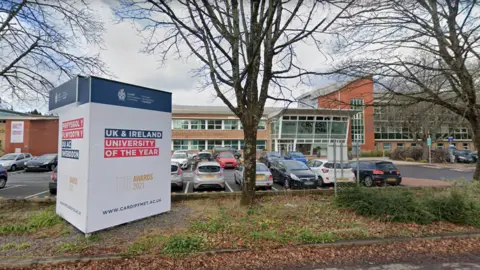University strike: All nine in Wales affected by action
 Getty Images
Getty ImagesStudents in Wales will see lectures and seminars cancelled as thousands of university staff go on strike.
University and College Union (UCU) members will walk out on Thursday 24 November, and 25 and 30 November over pay, conditions and pension cuts.
All nine universities in Wales will be affected by strike, but said they would work to minimise disruption.
One union representative said staff could not offer the "education students deserve, and that's on our employers".
Charlie Palmer, a second year student studying fashion design at the University of South Wales, said he backed his lecturers.
He said staff in department had been supportive and were "willing to do anything for me so I'm willing to do whatever for them", he said.
"I do have a lot to be doing and a lot of lectures going on so it is a bit of a worry - but I understand why they're doing it and I'm behind them."

Media and film students Ben Hancock and Morgan Hulse said most of their seminars, lectures and workshops on Thursday and Friday had been cancelled.
Ben, who is in his first year, said "as long as it's bettering the pay of people" he was "fully in support".
"When it comes to these strikes in the uni, the rail strikes, any sort of strike, I'm all for it because it's for the betterment of everyone who works," Morgan said.

Several Welsh universities said they expected disruption to be "minimal".
University of Wales Trinity St David's and Swansea University said it has plans to mitigate disruption to their students.
Cardiff Metropolitan University said it anticipated most staff would work normally.
"In all cases, Cardiff Met will do its utmost to mitigate the impact of strike action on both the provision of teaching and the student experience", a spokesperson said.
Bangor University said it was disappointed at the outcome of the ballots for industrial action.
 Google
GoogleThe Open University in Wales said it believed the likelihood of "any significant impact to students' studies to be relatively low".
The University of South Wales urged students to attend sessions as normal, unless told otherwise.
Dr Anita Naoko Pilgrim, UCU Wales rep for the Open University, said that "in effect" striking staff were "doing this for the students".
"For many years now the working terms and conditions in universities has deteriorated. We've seen pay go down in real terms by about 25%.
"This sector is broken and the managers need to sit down with the unions and fix it."
 Dr Anita Nakao Pilgrim
Dr Anita Nakao PilgrimThe Universities and Colleges Employers Association, which negotiates on pay on behalf of the universities, said there was "widespread disappointment across the sector at the attempts to disrupt HE institutions by targeting students".
It said that the union's demands of a 13.6% pay rise were "unrealistic" and would cost universities "in the region of £1.5bn".
Some staff are also striking over pensions, claiming that cuts to benefits were based on a flawed revaluation of the pension fund.
Prof Steve West, president of Universities UK, said its pension "remained one of the most attractive private pension schemes in the country", and he was "saddened" to see industrial action "which could cause disruption to students and other members of staff".


